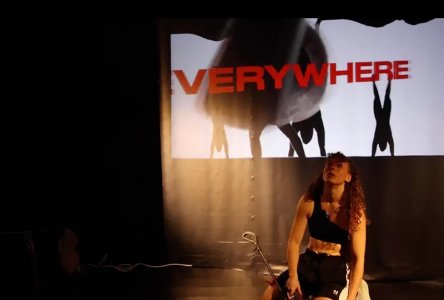
4:48 PSYCHOSIS
4:48 PSYCHOSIS, Workhorse Theatre Company & Red Line Productions at the Old Fitz, 16 August-9 September 2017. Photography by Andre Vasquez: above - Lucy Heffernan and Ella Prince; below - Zoe Trilsbach; below again - Lucy Heffernan
In our times of uncertain funding and dodgy futures, there’s much nervous chatter about taking risks in theatre; but the main risk, surely, lies in not taking risks. Choosing the apparently safe low road might feel like the right thing to do, but invariably it’s the high road – the road less travelled – that turns out to be the most thrilling and rewarding. So it is with this new and beautiful production of Sarah Kane’s last play, 4:48 Psychosis.
Performed by Lucy Heffernan, Ella Prince and Zoe Trilsbach, and directed by Anthony Skuse, the play’s creative team is completed by Alexander Berlage’s lighting of Jeremy Allen’s set design, and Benjamin Freeman’s composed soundscape. Each element is critical to the others in a remarkable feat of dramatic teamwork.
Sarah Kane was only 28 when she died by her own hand yet her impact on British and European theatre was already considerable. In just five years, beginning at 23, she had written five plays and been subject to the burdens of fame and notoriety. These added to the weight of her intermittent but persistent and severe depression.
Where this dreadful pain came from is not for glib analysis, but she was born and brought up in suburban Essex, a stultifying environment made infinitely worse by her parents’ conversion to evangelical Christianity and her own immersion in it. Something she later described as “born-again lunacy”.

And for those who wonder at or rail against the savagery and rage in her work, she also said, “The reading I did in my formative years was the incredible violence of the Bible. It was full of rape, mutilation, war and pestilence.”
It’s not possible now to view 4:48 Psychosis without the coloration of that knowledge, not least because its main character – brilliantly illuminated – is in many ways, depression itself.
The script is a similar gift and burden: no particular characters are specified, no particular setting demanded, no stage directions given. It’s up to the director and actors of each production to make those decisions for themselves – a frightening freedom when the more common thing is to chafe against a playwright’s constraints and demands.
Skuse and his company of three have settled on a division of the text between characters and ideas. There is a young woman, a psychiatrist and also a shifting relationship between them and something more amorphous yet absolutely tangible. It’s the pain and deep thought and emotions that form the inner kaleidoscope that can be the experience of existential depression. And this is made mesmerisingly clear by the set’s distorted mirrored backdrop – we see ourselves, but of course we are distorted by others’ impressions and others’ ideas.

The 24 sections of the play are like a dreamlike exploration of an active and curious mind, one that Kane had observed closely in its various surroundings and experiences. She had originally wanted to be a poet but decided that theatre gave her more room to move; her language, when not sardonic and brutal, occasionally funny, is poetic in its distilled and precise imagery – 4:48 Psychosis is beautiful to listen to as the “characters” explore human love and violence and aloneness (not loneliness).
As well, there are recurring motifs of how a “hatch opens, stark light” – which are played out here in the misty chilly dark as shafts of white light or occasional washes of dazzling gold. And the familiar ploy of having to count backwards from 100 in sevens – a favourite of hospital psychs to check on whether you’re still with us, but which makes no allowances for the mathematically challenged among us.
There is no doubt that 4:48 Psychosis is one of the more challenging theatre experiences of this year and it should be handled with care by anyone who’s feeling fragile. Nevertheless, the performances and the exquisitely wrought production (intricately interwoven sound and light, and impeccable direction) make this an absorbing, tender, shocking and extraordinary 65 minutes. Totally recommended.

-c444x300.jpeg)

